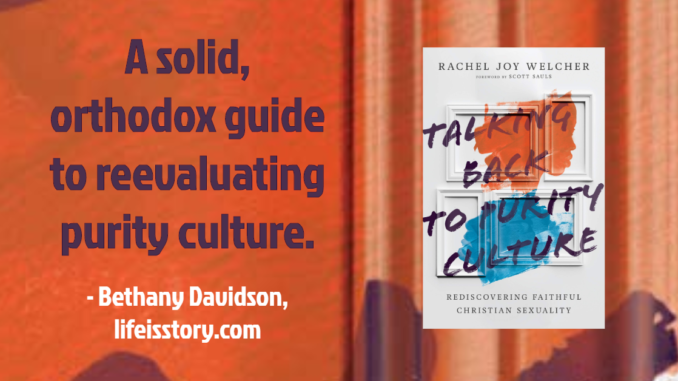
Published by IVP on November 10, 2020
Genres: Non-Fiction, Christian Life, Marriage, Parenting, Theology
Buy on Amazon
Goodreads

It's time to talk back. The generation born into evangelical purity culture has grown up, and many have started families of their own. But as time goes on, it's becoming more evident that many still struggle with purity culture's complicated legacy--its idolization of virginity, its mixed messages about modesty and lust, and its promise of a healthy marriage and great sex for those who follow the rules. In Talking Back to Purity Culture, Rachel Joy Welcher reviews the movement carefully, examining its teachings through the lens of Scripture. Compassionate, faithful, and wise, she charts a path forward for evangelicals in the ongoing debates about sexuality--one that rejects legalism and license alike, steering us back instead to the good news of Jesus. It's time to talk back to purity culture--and this book is ready to jump-start the conversation.
Talking Back to Purity Culture involves so many loaded topics that it is hard for me to know where to begin. I have an immense respect for Rachel Joy Welcher just for taking on the challenge of writing it. Throughout the book, she provides an orthodox perspective on purity culture, addressing its unbiblical promises and demands without discarding Scripture in the process. Unlike other books about the purity movement, which focus on religious deconstruction and reject Christianity, this book reevaluates purity culture through an orthodox lens, asking where Christians can go from here. Welcher separates biblical teaching from human-constructed legalism, and encourages her readers to be willing to reevaluate their beliefs.
Evaluating the Fallout
At the beginning of Talking Back to Purity Culture: Rediscovering Faithful Christian Sexuality, Welcher provides a history of the movement from the late 1990s to the present, quoting from popular books that shaped many young Christian’s views of sexuality and their faith. In response to these books, she cites published resources and shares personal stories that show the damage and fallout from these beliefs. Some of these stories come from her own life, others are from personal conversations, and still more come from official interviews. In the following chapters, she addresses how purity culture held out heterosexual marriage and children as a guaranteed reward for chaste behavior without acknowledging the realities of long-term singleness, same-sex attraction, divorce, marital frustrations, and infertility.
Welcher also provides a complex analysis of how badly Christian culture addressed sexual abuse during this era. Only the worst resources actively blamed victims for inviting their trauma, but others sent mixed messages or avoided the topic. Welcher challenges Christians to keep sexual abuse victims in mind when they talk about sexuality, because even though writers and speakers have often treated abuse experiences as an anomaly, they are heartrendingly common. In my opinion, this is one of the strongest parts of the book, because she addresses the topic in great depth, with reference to a variety of different situations and experiences. There are other topics that she can only address in passing because of the book’s limited scope, but because she previously did academic research on this topic, she was able to address this with the depth and nuance that the topic deserves.
Looking to the Future
Welcher writes with great humility, leaving room for all the research, analysis, and understanding that is yet to come. She also maintains a gracious tone towards others, and because many books about the church’s failings are abrasive and condemning, I admire her ability to write about so many challenging topics with grace, compassion, and empathy for everyone involved. This book is not just for people who feel victimized by purity culture, but is also for those who promoted it, and those who still hold some of these beliefs. Welcher calls Christians to reevaluate their approach to understanding sexuality, and even though she is not yet a parent, her experience working with youth gives her credibility, especially in the chapter about how parents can pursue ongoing, nuanced conversations about sexuality with their children.
She also encourages adult Christians to talk about sexuality with each other, and supports this by providing discussion questions and group activity ideas at the end of each chapter. It never would have occurred to me to view this as a reading group recommendation, but I agree that challenging topics like this should not stay within the realm of private reading, and need to spill over into conversations and relationships within the church. I appreciate the thought, effort, and care that Welcher invested into writing this book, and even though it cannot possibly cover every person’s experience or concern, the discussion questions give readers a chance to build on this in their own conversations. This is a solid, orthodox guide to reevaluating purity culture and seeking a better path forward.



